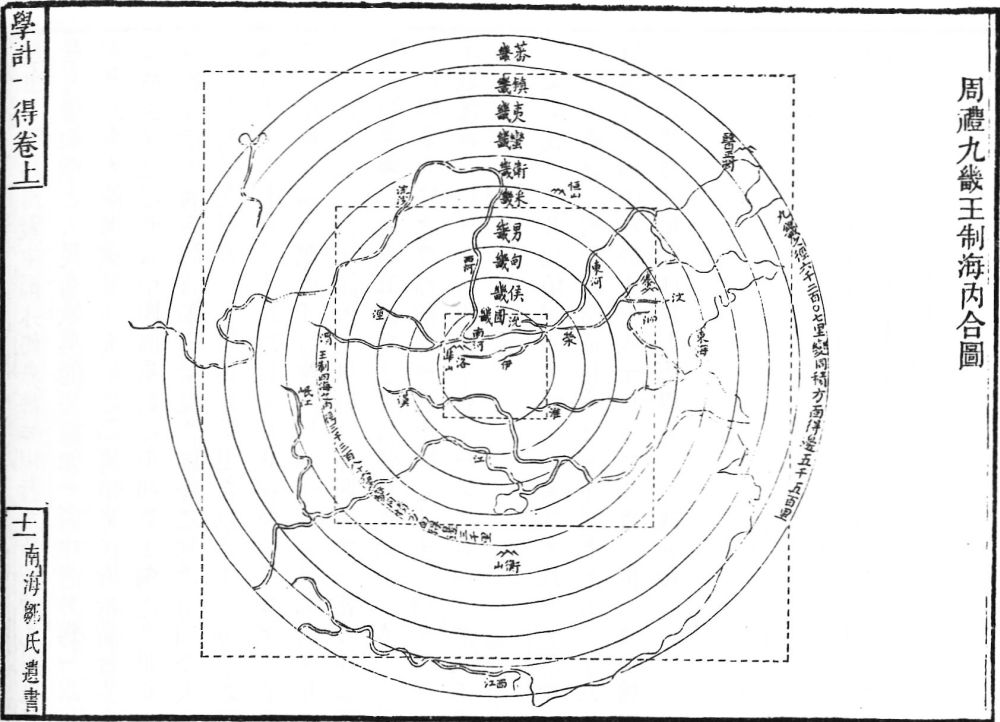Wangzhi 王制 "Royal regulations" is a chapter of the ritual classic Liji 禮記 and described putative modes of governance in the Western Zhou period 西周 (11th cent.-770 BCE). It is the result of a collection of related statements in the various Confucian Classics and was compiled on order of Emperor Wen 漢文帝 (r. 180-157 BCE) of the early Former Han period 前漢 (206 BCE-8 CE).
The text deals with investiture of regional rulers, the award of titles of nobility (gong 公, hou 侯, bo 伯, zi 子, nan 男), state functionaries (gong 公, qing 卿, dafu 大夫), state sacrifices, offerings at the ancestral temples, court audiences, mourning ceremonies, inspection and hunting tours, jurisdiction and education.
 |
Model of Zou Boqi 鄒伯奇 (1819–1869) superimposing zones of rule on a modern map, from Zou Zhengjun yishu 鄒徵君遺書. |
In fact, not many of the details described reflect reality of the governance system of the Western Zhou, nor do they fully correspond to the regulations described in the classic Zhouli 周禮, which includes quite a lot of administrative regulations. The text must be read as a government programme of Confucian thought, meaning that the ruling elite had the duty to instruct and educate the people in matters of propriety ("virtue") in order to enforce obedience, to make clear fixed modes of conduct for the nobility in order to have them serve the ruling dynasty, and to settle social functions within society to make social communication free from frictions.
The two important tools to achieve these aims were the "six ceremonial observances" (liuli 六禮), namely capping rites, nuptial rites, mourning rites, state sacrifices, district ceremonies (like archery contests), and social encounters of the nobility, and the "seven lessons" (qijiao 七教) of morality, namely between father and sons, the older and the younger brothers, husband and wife, lord and ministers, the older and the younger, friend and friend, and host and guest.
The chapter discerns between two types of learning, namely the "lesser learning" (of the nobility) which took place south of the Ducal Palace, and the "greater learning" (daxue 大學) which was carried out in the royal Biyong Hall 辟雍 and the 頖宮 (also written 泮宮) of the regional states, respectively.
Rulership was to be carried out by a well-tempered mix of moral instruction and the application of penalties. The targeting of the "eight objects of government" (bazheng 八政) aimed at discarding excess and ward off wickedness, unifying the people in the "royal way", nourish the eldlery, comforting the orphaned and the solitary people, supporting the crippled, deaf, and mute, elevating the worthy men, and discard the unworthy. In practice, the "eight objects of government" were tools to discern social status by dishes of food and drink, clothes, service, the maintenance of distinctions, measures of length and cpacity, numbers, and assigned rules (zhi 制).
Wangzhi is also a chapter of the Confucian collection Xunzi 荀子. The author stresses that social differences were based on natural principles, just like there was a difference between sky and earth. The way of governance was the ruler's even-handed treatment to display his love towards the common folks (ping zheng ai min 平政愛民), his respect for propriety in order to appreciate his servants (long li jing shi 隆禮敬士), and his of exaltation of worthies in order to have them work for the aims of the dynasty (shang xian shi neng 尚賢使能).